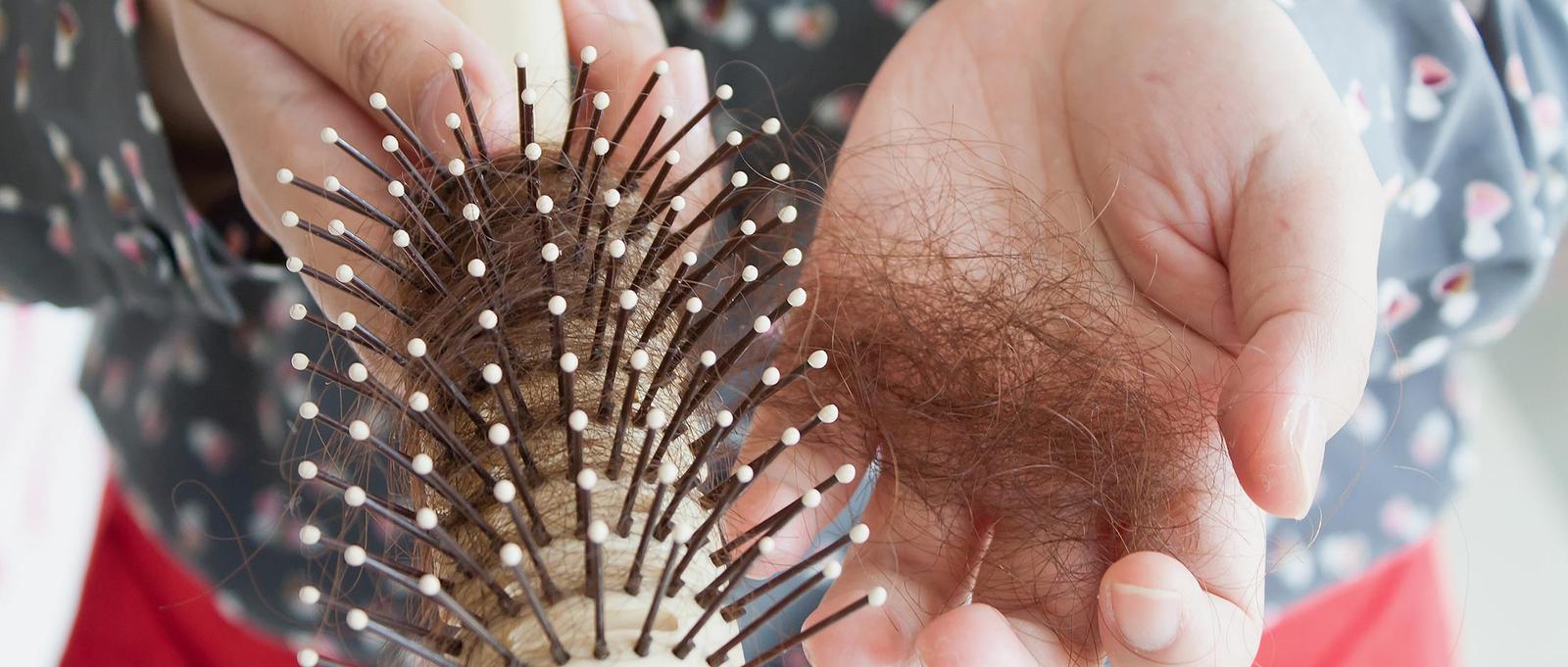
Comprendre la perte de cheveux chez la femme
Peer reviewed by Dr Hayley Willacy, FRCGP Last updated by Dr Sarah Jarvis MBE, FRCGPLast updated 18 Sept 2017
- TéléchargerTélécharger
- Partager
Nous, les femmes, souffrons de douleurs menstruelles, d'accouchement et de ménopause. Mais au moins, contrairement aux hommes, nous n'avons pas à craindre de devenir chauves. Ou bien est-ce le cas ? Même si elle est moins fréquente chez les femmes, la calvitie n'est pas l'apanage des hommes.
Dans cet article :
Poursuivre la lecture ci-dessous
How our hair goes through three ‘lifetime’ phases
I never cease to be amazed at how often women consult me about hair loss – mostly because when I check their hair, I can’t find anything wrong. But your crowning glory has a huge effect on your self-esteem. That means it’s hardly surprising that panic sets in when you start waking up with hair all over your pillow. In fact, if you’re a woman, it virtually never means you’re going to lose all your hair.
Your hair naturally goes through three phases in its ‘lifetime’:
The first is the growing phase, which lasts for three to five years.
Next comes the ‘shrinking’ phase, which lasts just a couple of weeks
Then the resting phase for three months or so. Towards the end of this, the hair follicle starts a new growing phase and pushes the old hair out if it hasn’t fallen out or come out on your hairbrush.
In some animals these phases happen at around the same time, which is why some dogs moult in summer, leaving your house covered in hair. Most humans lose a few hairs every day, although it can be more in times of stress.
Some kinds of cancer chemotherapy can stop the hair growing phase, which is why hair loss is an issue. Wearing a cold cap (literally an ice cap for your head) before treatment starts cuts the risk of this happening – if you are due to start chemotherapy, your cancer nurse can advise.
Causes of thinning hair in women
Some of the causes of female hair loss can include:
Stress, childbirth and crash diets, which can push your hair suddenly into the resting phase.
Certain medicines.
Going through menopause.
Having an underactive thyroid gland.
Being short of iron (even if you’re not anaemic).
Not enough high quality protein in your diet.
Your doctor may suggest a blood test to check your thyroid and iron levels if you are concerned about hair thinning.
Poursuivre la lecture ci-dessous
Qu'est-ce que l'alopécie ?
The medical term for hair loss is alopecia. One kind – alopecia areata – causes patches of total hair loss with completely normal hair around. These patches can vary from small spots, less than the size of a 10 pence piece, to the whole scalp. Much less often, eyebrows, eyelashes, the beard area and even pubic hair can be affected. Alopecia areata is an autoimmune disease – your body’s immune system recognises part of your body as an enemy and attacks it. It only affects your hair and won’t affect your general health in any way. However, you are at slightly higher risk of other autoimmune conditions like underactive thyroid or rheumatoid arthritis. It can run in families, with men and women equally affected.
Choix des patients pour Problèmes de cheveux et de cuir chevelu

Santé de la peau, des ongles et des cheveux
À quelle fréquence devez-vous vous laver les cheveux ?
Bien que vous ayez probablement une routine de soins capillaires qui fonctionne pour vous et votre style de vie, pouvez-vous être sûr que vous vous lavez les cheveux au bon moment et que vous utilisez les meilleurs produits pour votre type de cheveux ? Voyons à quelle fréquence vous devriez vous laver les cheveux (c'est probablement moins souvent que vous ne le pensez) et les méthodes simples que vous pouvez utiliser pour découvrir votre type de cheveux.
par Emily Jane Bashforth

Santé de la peau, des ongles et des cheveux
Alopécie areata
L'alopécie areata est une affection caractérisée par l'apparition de plaques de cheveux, généralement sur la tête. Dans certains cas, la calvitie est totale. En général, les cheveux repoussent après plusieurs mois. Dans certains cas, la perte de cheveux est permanente. Les traitements visant à favoriser la repousse des cheveux fonctionnent dans certains cas, mais les cheveux repoussent souvent d'eux-mêmes.
par le Dr Philippa Vincent, MRCGP
Does alopecia cause permanent hair loss?
The good news is that in alopecia areata, the hair follicles your hairs grow from aren’t permanently damaged, and many people regain a full head of hair within months. In fact, as long as less than half your scalp is affected, you have a four in five chance of full recovery within a year. The older you are when it starts, the less hair tends to be lost and the better the chance of regaining a full head of hair.
Poursuivre la lecture ci-dessous
What are the treatments for hair loss?
Because alopecia areata doesn’t cause any other symptoms, treatment isn’t always necessary, especially if only small patches are affected and a change in hairstyle will hide the problem. For more extensive hair loss, steroid injections into your scalp may help. Steroid cream might also be tried, although it’s less effective.
In men, hair loss is often thought to be related to male hormone levels. In fact, men who go bald usually have normal testosterone levels, but the hair follicles become super-sensitive to testosterone, making the hair follicles shrink. Don’t forget the skin where hair has been lost is sensitive to sunlight and burns easily. That means hats and sunscreen from spring to autumn, even if you don’t think it’s sunny enough to burn!
Women also get hormone related, but it’s almost always general thinning rather than receding hairline or bald patch, and it does not lead to total baldness. For general thinning hair, you can buy a solution called ‘minoxidil’ from pharmacists – it’s not available on the NHS.
It is worth seeing your doctor if your hair starts thinning. Sometimes medications can be to blame. If underactive thyroid or iron deficiency are the cause, these can be treated.
Nous remercions le magazine "My Weekly", qui a publié cet article à l'origine.
Historique de l'article
Les informations contenues dans cette page ont été évaluées par des cliniciens qualifiés.
18 Sept 2017 | Latest version

Demandez, partagez, connectez-vous.
Parcourez les discussions, posez des questions et partagez vos expériences sur des centaines de sujets liés à la santé.

Vous ne vous sentez pas bien ?
Évaluez gratuitement vos symptômes en ligne